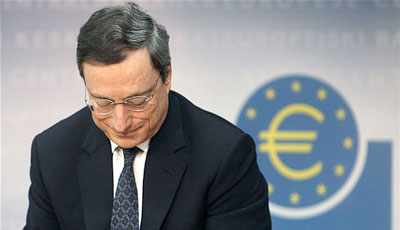ECB to Continue Buying Debt Until Inflation Stabilizes

Central Bank will purchase large amounts of public and private debt for at least 18 months
The European Central Bank will purchase large amounts of public and private debt for at least 18 months and until it is convinced that inflation will stabilize near annual rates of 2%, the bank’s president Mario Draghi said on Monday, underscoring the ECB’s willingness to flood the eurozone with freshly minted money far into the future.
In testimony to European parliament, Mr. Draghi also urged Greece to commit to fully honoring its debt obligations. Its government also must be specific about areas of economic and fiscal reforms where it is in agreement with its international creditors and, where there is disagreement, “how (the reforms) are going to be replaced has to be specified,” he said.
Referring to the ECB’s bond purchase program, now entering its third week, Mr. Draghi said: “We intend to carry out our purchases at least until end-September 2016, and in any case until we see a sustained adjustment in the path of inflation which is consistent with our aim of achieving inflation rates below, but close to, 2% over the medium term.”
Mr. Draghi’s testimony comes two weeks after the ECB launched a program to purchase more than €1 trillion in bonds—mostly government debt—by September 2016. The purpose of the program, known as quantitative easing, or QE, is to raise inflation rates closer to the ECB’s target of near 2%. The ECB has said it would buy bonds at a monthly clip of €60 billion and that the purchases could even extend beyond September of next year.
“The Governing Council will take a holistic perspective when assessing the path of inflation. It will evaluate the likelihood for inflation not only to converge to levels that are closer to 2%, but also to stabilize around those levels with sufficient confidence thereafter,” Mr. Draghi said.
Consumer prices were down 0.3% from year-ago levels in February, the third-straight decline on an annual basis.
The ECB’s bond plan reduced government and corporate bond yields, and weakened the euro, even before it was approved in January. That has made it easier for businesses to finance new investment, while the weaker exchange rate has made eurozone exports more competitive in global markets.
‘We intend to carry out our purchases at least until end-September 2016, and in any case until we see a sustained adjustment in the path of inflation which is consistent with our aim of achieving inflation rates below, but close to, 2% over the medium term.’
—Mario Draghi, European Central Bank president.
Recent economic reports suggest that gross domestic product in the 19-member eurozone has strengthened in the first quarter after expanding at an annualized rate of 1.4% during the last three months of 2014. The bloc’s recovery has been led by its largest member, Germany, which has benefited from both reduced financing costs and the lower euro.
“The most recent data and survey evidence show that growth is gaining momentum,” Mr. Draghi said. “The basis for the economic recovery in the euro area has clearly strengthened.”
Mr. Draghi rejected a suggestion from one parliamentarian that the ECB was gearing its stimulus policies to weaken the euro. “Nothing could be further from the truth,” he said, noting that the ECB and other major central banks conduct their policies to achieve domestic mandates. The ECB is alert to the possibility that ultra-accommodative monetary policies may pose risks to financial stability, he said, adding that these risks are best addressed through regulatory and supervisory tools known as macroprudential policies.
Mr. Draghi’s comments on Greece echoed those made earlier Monday by ECB executive board member Benoît Coeuré that signaled some willingness to be flexible on how the government in Athens meets the reform commitments it has made as a condition for an international bailout. The ECB is one of three institutions along with the European Commission and International Monetary Fund, known collectively as the Troika, overseeing Greece’s bailout.
“Practically, the commitment means that the aim is to successfully conclude the review of the program, even if it is understood that the program may be amended to reflect the priorities of the new government,” Mr. Coeure said in Montenegro, in comments confirmed by a spokeswoman.
“It nevertheless has to be a comprehensive discussion, to make sure that any change in the program reaches an equivalent outcome in terms of competitiveness, in terms of fiscal sustainability, in terms of putting the Greek economy on a sound footing,” Mr. Coeure said.
Source: WSJ – ECB to Continue Buying Debt Until Inflation Stabilizes





























